Filter by
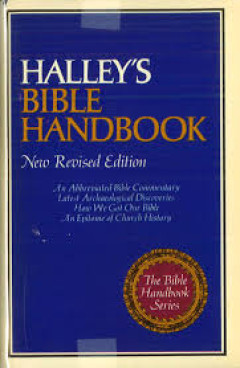
Bible Handbook
- Edition
- -
- ISBN/ISSN
- 03110257204
- Collation
- 860hlm, 12,5x18,5 cm
- Series Title
- -
- Call Number
- 220.7
- Edition
- -
- ISBN/ISSN
- 03110257204
- Collation
- 860hlm, 12,5x18,5 cm
- Series Title
- -
- Call Number
- 220.7
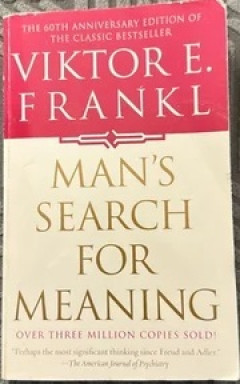
Man's Search For Meaning
Now in its 60th year the landmark bestseller by the great Viennese psychiatrist remembered for his tremendous impact on humanity MAN'S SEARCH FOR MEANING Internationally renowned psychiatrist Viktor E. Frankl endured years of unspeakable horror in Nazi death camps. During, and partly because of, his suffering, Dr. Frankl developed a revolutionary approach to psychotherapy known as logothe…
- Edition
- -
- ISBN/ISSN
- 9780671023379 / 0671023373
- Collation
- Softcover; 222 hlm.; 10.7 x 17.2 cm
- Series Title
- -
- Call Number
- 940.5318092
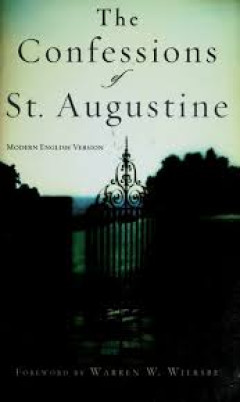
The Confessions of St. Augustine
Confessions is one of the most moving diaries ever recorded of a man's journey to the fountain of God's grace. Writing as a sinner, not a saint, Augustine shares his innermost thoughts and conversion experiences and wrestles with the spiritual questions that have stirred the hearts of the thoughtful since time began. Starting with his childhood in Numidia, through his youth and early adulthood …
- Edition
- -
- ISBN/ISSN
- 0-80078724-2 / 9-780800-787240
- Collation
- Softcover; 199 hlm.; 12 x 18 cm
- Series Title
- -
- Call Number
- 270.2092

Ketika Menolong Justru Menyakiti: Bagaimana Meringankan Kemiskinan tanpa Meny…
NIAT BAIK SAJA TIDAKLAH CUKUP - Melepaskan dan memperlengkapi orang untuk dengan efektif menolong kaum miskin memerlukan pertobatan dan kesadaran akan kerusakan kita. Buku ini menguraikan kerangka yang alkitabiah terkait dengan penyebab-penyebab utama kemiskinan dan pengentasannya. Apakah Anda terlibat dalam misi jangka pendek atau pemberdayaan jangka panjang bagi kaum miskin, buku ini memba…
- Edition
- 1
- ISBN/ISSN
- 9786023930623
- Collation
- Softcover; 312 hlm.; 15.3 x 23.5 cm
- Series Title
- -
- Call Number
- 261.8
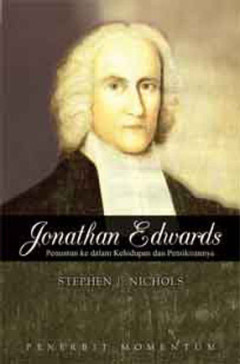
Jonathan Edwards: Penuntun ke dalam Kehidupan dan Pemikirannya
Edwards tetaplah theolog terbesar Amerika, dan karya-karyanya memiliki nilai yang terus bertahan bagi gereja. Buku ini adalah pengantar yang sangat menolong untuk mengenal pelayanan dan pemikirannya. Nichols telah menyeleksi materi untuk buku ini dengan cermat untuk menolong pembaca memahami tulisan-tulisan Edwards yang terpenting.
- Edition
- -
- ISBN/ISSN
- 9789793292786
- Collation
- Softcover; 267 hlm.; 14 x 21 cm
- Series Title
- -
- Call Number
- 285.8092
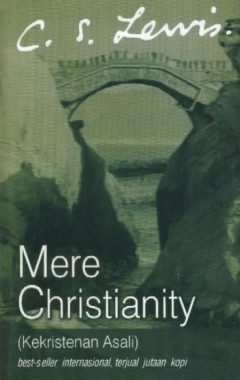
Mere Christianity: Kekristenan Asali
Sebagai salah satu introduksi yang paling populer dan dicintai mengenai iman Kristen yang pernah ditulis, Mere Christianity telah terjual sebanyak jutaan kopi di seluruh dunia. Buku ini menyajikan secara utuh siaran legendaris Lewis pada tahun-tahun peperangan, siaran-siaran yang dimaksudkannya untuk sekadar "menjelaskan dan membela kepercayaan yang umum bagi hampir semua orang Kristen di segal…
- Edition
- -
- ISBN/ISSN
- 9795421980
- Collation
- Softcover; 308 hlm.; 14.7 cm x 20.8 cm
- Series Title
- -
- Call Number
- 230
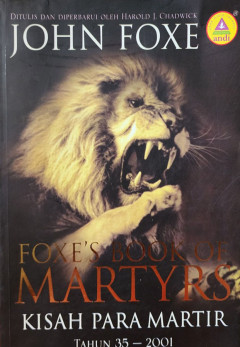
Foxe's Book of Martyrs: Kisah Para Martir Tahun 35 - 2001
"Foxe's Book of Martyrs" bukan sekedar buku bagi ahli sejarah. Foxe menulisnya untuk mendokumentasikan penganiayaan terhadap gereja; tubuh Kristus sendiri. Ini adalah buku tentang kasih karunia Allah dan kesetiaan anak-anakNya. Foxe's Book of Martyrs berkisah tentang iman yang tidak runtuh, tidak saja karena diterpa kesulitan hidup, bahkan apabila mengalami penganiayaan yang mengerikan dan beru…
- Edition
- -
- ISBN/ISSN
- 9797634493
- Collation
- Softcover; 383 hlm.; 19 x 26 cm
- Series Title
- -
- Call Number
- 272
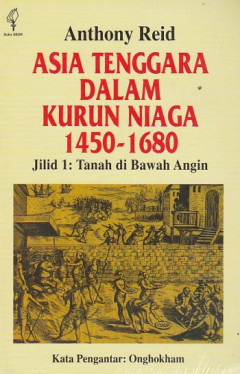
Asia Tenggara Dalam Kurun Niaga 1450 - 1680: Tanah di Bawah Angin, Jilid 1
Buku "Asia Tenggara dalam Kurun Niaga 1450 - 1680 ; Tanah di Bawah Angin" ini merupakan jilid pertama dari dua jilid penyusunan kronik permulaan kebudayaan Asia Tenggara dari tahun 1450 hingga 1680. Anthony Reid bersemangat meneliti secara cermat kehidupan sehari-hari masyarakat dalam hal wilayah, makanan, perumahan, perniagaan, pola-pola kesejahteraan dan pertunjukkan populer. Kajiannya memung…
- Edition
- 1
- ISBN/ISSN
- 9789794611081
- Collation
- Softcover; 356 hlm.; 16 x 24 cm
- Series Title
- -
- Call Number
- 380.10959
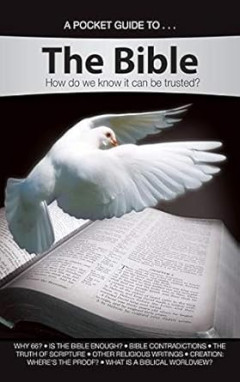
A Pocket Guide To: The Bible: How Do We Know It Can be Trusted?
Why are there 66 books in the Bible? Is the Bible missing any books? Who wrote the Bible? Is The Bible enough? Are there contradictions? Where is the proof of creation? This Pocket Guide to the Bible will give you answers to these questions and more. The Bible contains the very words of God and is the key to understanding the world in which we live. It is the history book of the universe, an…
- Edition
- -
- ISBN/ISSN
- 9781600922657
- Collation
- Softcover; 96 hlm.; 11.3 x 18.1 cm
- Series Title
- -
- Call Number
- 220.52

A Pocket Guide To: Noah's Ark: A Biblical and Scientific Look at the Genesis …
Can we really believe the biblical account of Noah's Ark? How could it hold all those animals? How could Noah care fo all of them? What did Noah's Ark look like? How did kangaroos get to Australia? Has Noah's Ark been found? Answer these questions and more with this biblical and scientific look at the Genesis account of Noah and his obedience. The Pocket Guide to Noah's Ark combines the late…
- Edition
- -
- ISBN/ISSN
- 9781600922527
- Collation
- Softcover; 95 hlm.; 11.4 x 18.1 cm
- Series Title
- A Pocket Guide To...
- Call Number
- 220
 Computer Science, Information & General Works
Computer Science, Information & General Works  Philosophy & Psychology
Philosophy & Psychology  Religion
Religion  Social Sciences
Social Sciences  Language
Language  Pure Science
Pure Science  Applied Sciences
Applied Sciences  Art & Recreation
Art & Recreation  Literature
Literature  History & Geography
History & Geography